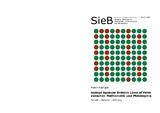Citation link:
https://nbn-resolving.org/urn:nbn:de:hbz:467-10068Files in This Item:
| File | Description | Size | Format | |
|---|---|---|---|---|
| Dissertation_Martin_Rathgeb.pdf | 3.21 MB | Adobe PDF |  View/Open |
| Dokument Type: | Doctoral Thesis | metadata.dc.title: | George Spencer Browns Laws of form zwischen Mathematik und Philosophie : Gehalt - Genese - Geltung | Other Titles: | George Spencer Brown’s Laws of form between mathematics and philosophy : content - genesis - validity | Authors: | Rathgeb, Martin | Institute: | Fakultät IV Naturwissenschaftlich-Technische Fakultät | Free keywords: | Simon, Josef, Spencer-Brown, G., Stekeler-Weithofer, Pirmin, Kvasz, Ladislav, Logik, Logic | Dewey Decimal Classification: | 510 Mathematik | GHBS-Clases: | TAQP TBP TBU TCZ |
Issue Date: | 2016 | Publish Date: | 2016 | Series/Report no.: | SieB - Siegener Beiträge zur Geschichte und Philosophie der Mathematik | Source: | Zugl. ersch.: Siegen : universi - Universitätsverlag Siegen, 2016 | Abstract: | George Spencer Brown hat in Laws of Form (1969) einen Indikationenkalkül vorgelegt, der in einem seiner Teile - bei geeigneter Lesart - eine Axiomatisierung der Struktur Boolescher Algebren ist. Der erste Teil meiner Arbeit behandelt den GEHALT des Indikationenkalküls und steht insofern im Paradigma "Mathematik als Struktur". Der Kalkül wird im Kontext eines mathematischen und das Produkt spezifizierenden Diskurses auf sein Satzsystem hin betrachtet. Diesen Zugang finde ich durch eine bekannte beweistheoretische Untersuchung und setze ihr meine gleichungslogische Alternative entgegen, die den Text besser erfasst. Der Indikationenkalkül beginnt mit einer zweiwertigen Arithmetik und öffnet sich Überlegungen zu ihrer Erweiterung um sog. Brownsche Werte. Verschiedene inner- und außermathematische Anwendungen des Kalküls und seiner Erweiterung sind mittlerweile gezeigt. Um eine solche Aus- und Weiterführung geht es mir nicht. Stattdessen behandelt der zweite Teil meiner Arbeit die GENESE des Kalküls und steht insofern im Paradigma "Mathematik als Tätigkeit". Der Kalkül wird im Kontext eines linguistischen und den Prozess fokussierenden Diskurses auf die Ertüchtigung seiner Sprache hin betrachtet. Ich bespreche dafür - veranlasst durch die Zeichenphilosophie Joseph Simons - das Buch zunächst ’im Rückwärtsgang’ und konkretisiere die Genese dann vorwärts gerichtet aus der linguistischen Perspektive von Ladislav Kvasz. Der mathematische Essay Laws of Form kann insbesondere als Mathematik in nuce und als Vorschlag mathematischer Grundlegung gelesen werden. Die im Titel genannten Gesetze der Form zeigen sich dann als Gesetze des Zeichengebrauchs - insbesondere des Bezeichnens und des Unterscheidens. Selbige erfahren im Text eine methodische Selbstthematisierung. Der dritte Teil meiner Arbeit behandelt demnach im Paradigma "Spiegelungen der Mathematik" die GELTUNG der von Brown behandelten Mathematik und stellt sie dafür in einen philosophischen und auf ihren Sinn bezogenen Diskurs. So gehe ich mit Peter Reisingers Rationalitätstypologie auf die Konzeption des Textes ein, untersuche mittels der Mathematikphilosophie von Pirmin Stekeler-Weithofer seinen Anfang und beobachte abschließend im Lichte der Zeichenphilosophie Josef Simons die Mathematik von Spencer Brown. With Laws of Form (1969), George Spencer-Brown presented a calculus of indication that can partly be viewed as axiomatization of the structure of Boolean Algebras. The first section of the present thesis deals with the CONTENT of this calculus of indications and thus can be regarded in the paradigm of "mathematics as structure". Here, the calculus will be examined as system of propositions in relation of mathematics as product. This approach is based on common proof theory and will in turn be contrasted with an alternative approach based upon equational logic that shows to grasp the text far better. The calculus of indications starts out with a two-valued arithmetic and opens to considerations of extension by so-called Brownian values. In the meantime, various inner and extra-mathematical applications of this calculus and its extensions have been put forward. It is not my intention to further these extensions by another contribution. Instead, the second section of my thesis deals with the GENESIS of the calculus and thus can be related to the paradigm "mathematics as activity". In the context of mathematics as process, the calculus will be examined for the potentialities of its language. Influenced by Josef Simon’s Zeichenphilosophie I will firstly discuss the book reversely, starting in the middle, and will then in turn concretize the genesis from a linguistic perspective according to Ladislav Kvasz starting at the beginning. The mathematical essay, Laws of Form, can especially be regarded as mathematics in a nutshell and as a proposal of mathematical foundations. The laws of forms mentioned in the title can then be interpreted as laws of sign usage, especially of indication and distinction. Both, indication and distinction, are discussed in terms of their methodical application. The last section of this thesis deals then with the VALIDITY of the mathematics discussed by Brown and relates it to the discourse concerned with philosophy and question of meaning. Thus, I will analyze the conception of the text on the basis of Peter Reisinger’s Rationalitätstypologie, its beginning by means of the philosophy of mathematics by Pirmin Stekeler-Weithofer and subsequently Spencer-Brown’s mathematics in the light of Josef Simon’s Zeichenphilosophie. |
URN: | urn:nbn:de:hbz:467-10068 | URI: | https://dspace.ub.uni-siegen.de/handle/ubsi/1006 | License: | https://dspace.ub.uni-siegen.de/static/license.txt |
| Appears in Collections: | Hochschulschriften Universi |
This item is protected by original copyright |
Page view(s)
2,345
checked on Apr 3, 2025
Download(s)
1,486
checked on Apr 3, 2025
Google ScholarTM
Check
Items in DSpace are protected by copyright, with all rights reserved, unless otherwise indicated.

